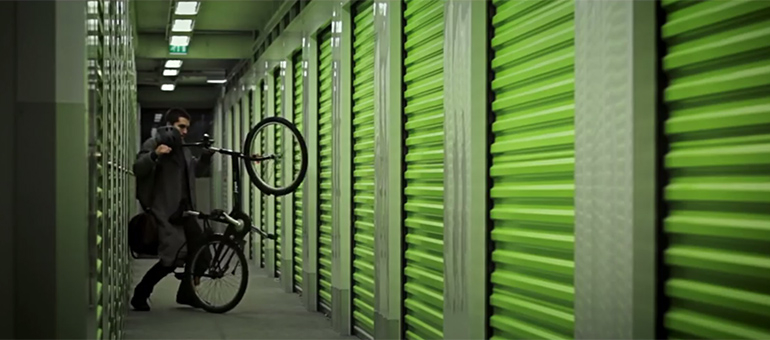MY STUFF: Interview mit Regisseur Petri Luukkainen

Was ist wirklich wichtig im Leben? Petri Luukkainen wagte ein Experiment: er verstaute alles, was er besaß, in einem Selfstorage-Abteil. Ein Jahr lang durfte er jeden Tag einen Gegenstand herausholen, so begann das Experiment nackt in einem leeren Apartment.
Der Regisseur lässt die Welt an seinem neuen Leben teilhaben: sein Kinofilm "MY STUFF" dokumentiert das Experiment. Am 5. März kommt der Film auch in die deutschen Kinos. Alexia Gerhardus hat mit Petri Luukkainen gesprochen.
Even in German speaking Europe a professional selfstorage industry has become very important to our modern society. It is also an important economic factor. Therefore several university institutes have initiated an academic reflexion process about the selfStorage sector and why modern society needs „so much STUFF“? Students have done thourough research on this. The results of these academic projects can be found on the „Platzprofessor-Blog“ that is jointly run by MyPlace and the University of Berlin. My questions are based on some aspects of that academic research…
According to the German Ministry for Environment, every European person owns an average of 10.000 things – did you count your stuff in the course of your experiment?
Petri Luukkainen I think 10.000-20.000 things seem to be quite realistic and a correct number! I did some research indeed before starting my experiment.
How many percent of your things did you REALLY need - not only to SURVIVE but also including the needs of your soul…?
My initial idea was not straight away to pack all my stuff away and to start out all naked in my appartement… My initial thought was that if you take a weekend trip to New York for example and then have to stay for a whole month, you can very well manage with the few things you brought along!
So I started packing for an experiment trying to find out how much I could take to the storage… And I had the idea that I would count my things while packing, as a mind game or so! But the counting got totally out of hand.
I tried to segment my all my gear and it took me weeks to go through all my items and it was horrible while counting. That was when I had the idea to do it the other way round: I would bring all my stuff away to the storage and bring the items back one by one. I didn´t want to decide at the moment which items I really needed or wanted – some I had literally never touched in my life.
So I decided on an experiment of one whole year to bring back one by one the items I wanted. I also wanted to play the experiment thoughout all 4 seasons of the year.
And the question is also, how do you count? I decided that one pair of socks would be one item, one bicycle also one item. After that year I had 365 things in my flat.
Did you bring back most of your things from the storage by now?
I am still reflecting over the year and the experience I made. And also, you know, I quite like the film for the public to end where it ends…
I always compare it to when people smoke and then they stopp smoking for lets say, a year – then when the year ends, people have changed. So have I, I know now how to live with little. And I am still testing it a little, I haven´t gone back to my old middle class life.
Did you find happiness without your stuff? How did the experience you went through change your life?
I like to compare the situation with when you come back from travelling, you look at your appartement and see how you have been able to be youself without all that.
And after the success of the film, I have spent a lot of time in hotels and it is almost similar to the time oft he experiment – you can only bring a certain number of your things along.
This project was a little like growing up – all your life you have been thaught by your parents, by society to buy things and to accumulate belongings. I just kind of ended that – it is very simple psychology!
Do we have to little space for all the stuff we have (stuff in relation to available space) or do we own too much stuff in general (independently of the space we have) ?
A futurologist I talked to, told me of a study where they put GPS trackers on different people checking out how they move around in their apartments. And they found out that independently of the space available, people use the same amount of space. We only have a limited amount of time in our days, in our homes…
Were you able to decide on what stuff was really necessary and what stuff was only the result of life in a consumer society?
The problem of having stuff is that you virtually see the items all the time, society teaches us how to present our things in our flat.
I learned to compare it with relations. Actively you can only have a certain amount of friends… Sometimes your social setting shifts a little and a person that was really close to you, might not be so close to you anymore because you don´t see that person so much anymore.
That is how it works with items because they are visually around us all the time, if you don´t see them anymore, you might not need them so much anymore.
And, the more stuff you have, the more relations you keep up, the more energy it takes from you.
The items all take their toll on you and take something back from you. I have now been living with less items for quite a while and I feel like I have been giving away less energy…
Were you able to keep up a normal life without your stuff? What did you do all day?
The idea of the project was to live a normal life. From the moment I had clothes, I lived a perfectly normal life, I even invited people over… Sometimes they needed to take their chair, and forks and knifes along…
Food and services (like money, etc.) were out of the experiment – this means that I could have food and money. That was because I definitely wanted to focus on my stuff – meaning the physical items. This is maybe also why people are so interested in the film.
The beginning point is that one has gone over a limit.
Did you feel „at home“ in your selfstorage unit once you had stored all your stuff there?
It was strange to put my things at another place. The meaning or the soul of the items change or might become clearer. Some things are quite straight forward, like bed, jacket, etc., some other things are more emotional. Having the things in the storage and bringing them back meant constant self-reflection. I was rebuilding my life.
I wasn´t in the best part of my life when I started the experiment but I didn´t allow myself to voice it then.
Of course I spent a lot of time at the storage – it became like an extension of my life. I went there like 3 times a week for half an hour. Or I would ask my brother to go by the storage and get this or that for me. As I had spent so much time packing and later searching for things and unpacking in the storage, I ended up knowing quite well where my things were.
Did you feel relieved once you had put all your stuff in the selfstorage unit?
I had spent 2 weeks packing all the boxes with the labels on and I kind of learned to know what I possessed. I had a good understanding of the things I needed at that moment. But what about the things I wouldn´t need in a year – what about next year?
It was a constant self-reflection that you normally don´t do because the stuff usually just sits in your apartment.
It was actually mentally quite tiring because I was constantly self-reflecting.
How did your family and friends react as you told them about the year to come of your experiment?
First my family reacted a bit skeptically but in a way I think most people were actually a bit jealous. It is a matter of investing your own time in something you really want. And our own time is the most valuable thing we have.
During the experiment I was a kind of a catalyst in many people´s lives. People were very interested in what I was doing and I thought if they want to do it, they should not talk about wanting to do it, they should just do it!
For me it was also a process that initially started with the idea of taking some things away. It is often like that in life, you have a vision and then you start doing something and things evolve on their own!
Alle Informationen zu den Spielstätten finden Sie auf Facebook.
Hier geht es zum Trailer des Films.
Platzprofessor Redaktionsteam

Das Redaktionsteam hinter dem Platzprofessor recherchiert laufend aktuelle Trends und Themen rund um das Thema Platz. Die RedakteurInnen sind immer auf der Suche nach spannenden Projekten und Beiträgen, die als Link-Tipp auf dem Platzprofessor veröffentlicht werden, initiieren Gastbeiträge und verfassen Artikel zu ausgewählten Themen.


